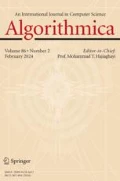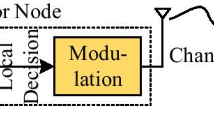Abstract
The wireless connectivity in pervasive computing has ephemeral character and can be used for creating ad hoc networks, sensor networks, connection with RFID (Radio Frequency Identification) tags etc. The communication tasks in such wireless networks often involve an inquiry over a shared channel, which can be invoked for: discovery of neighboring devices in ad hoc networks, counting the number of RFID tags that have a certain property, estimating the mean value contained in a group of sensors etc. Such an inquiry solicits replies from possibly large number of terminals n. This necessitates the usage of algorithms for resolving batch collisions (conflicts) with unknown conflict multiplicity n. In this paper we present a novel approach to the problem of collision resolution for batch conflicts. We show how the conventional tree algorithms for collision resolution can be used to obtain progressively accurate estimation of the multiplicity. We use the estimation to propose a more efficient binary tree algorithm, termed Estimating Binary Tree (EBT) algorithm. The EBT algorithm is suited for implementation when the conflicting nodes are passive, such as e.g. RFID tags. We extend the approach to design the Interval Estimation Conflict Resolution (IECR) algorithm. For n→∞ we prove that the efficiency achieved by IECR for batch arrivals is identical with the efficiency that Gallager’s FCFS algorithm achieves for Poisson packet arrivals. For finite n, the simulation results show that IECR is, to the best of our knowledge, the most efficient batch resolution algorithm reported to date.
Similar content being viewed by others
References
Chlamtac, I., Conti, M., Liu, J.: Mobile ad hoc networking: Imperatives and challenges. Ad Hoc Netw. J. 1(1), (2003)
Akylidiz, I.F., Su, W., Sankarasubramaniam, Y., Cayrici, E.: A survey on sensor networks. IEEE Commun. Mag. 40(8), 102–116 (2002)
Hush, D.R., Wood, C.: Analysis of tree algorithms for RFID arbitration. In: Proc. IEEE International Symposium on Information Theory, Boston, USA, August 1998
Cidon, I., Sidi, M.: Conflict multiplicity estimation and batch resolution algorithms. IEEE Trans. Inf. Theory 34, 101–110 (1998)
Hayes, J.F.: An adaptive technique for local distribution. IEEE Trans. Commun. 26, 1178–1186 (1978)
Capetanakis, J.I.: Tree algorithms for packet broadcast channels. IEEE Trans. Inf. Theory 25, 505–515 (1979)
Tsybakov, B.S., Mikhailov, V.A.: Free synchronous packet access in broadcast channel with feedback. Probl. Pereda. Inf. 14(4), 32–59 (1978)
Gallager, R.G.: Conflict resolution in random access broadcast networks. In: Proc. AFOSR Workshop Commun. Theory Appl., Provincetown, MA, September 1978, pp. 74–76 (1978)
Greenberg, A.G., Flajolet, P., Ladner, R.E.: Estimating the multiplicities of conflict to speed their resolution in multiple access channels. J. ACM 34(2), 289–325 (1987)
Massey, J.L.: Collision-Resolution Algorithms and Random-Access Communications. CISM Courses and Lectures, vol. 265, pp. 73–137. Springer, Berlin (1981)
Vvedenskaya, N.D., Pinsker, M.S.: Non-optimality of the part-and-try algorithm. In: Abstracts Intl. Workshop Conv. Codes, Multiuser Comm., Sochi, USSR, pp. 141–148 (1983)
Mosely, J., Humblet, P.: A class of efficient contention resolution algorithms for multiple access channels. IEEE Trans. Commun. 33(2), 145–151 (1985)
Motwani, R., Raghavan, P.: Randomized Algorithms. Cambridge University Press, Cambridge (1995)
Berstekas, D., Gallager, R.: Data Networks, 2nd edn. Prentice-Hall, New Jersey (1992)
Rom, R., Sidi, M.: Multiple Access Protocols: Performance and Analysis. Springer, New York (1990)
Tay, Y.C., Jamieson, K., Balakrishnan, H.: Collision-minimizing CSMA and its applications to wireless sensor networks. IEEE J. Sel. Areas Commun. 22(6), 1048–1057 (2004)
Molle, M.L., Polyzos, G.C.: Conflict resolution algorithms and their performance analysis. Tech. Rep. CS93-300, Department of Computer Science and Engineering, UCSD, July 1993
Puterman, M.L.: Markov Decision Processes: Discrete Stochastic Dynamic Programming. Wiley, New York (1994)
Wireless LAN Medium Access Control (MAC) and Physical Layer (PHY) Specification, IEEE Std. 802.11 (1997)
Leon-Garcia, A.: Probability and Random Processes for Electrical Engineering, 2nd edn. Addison-Wesley, Reading (1994)
Author information
Authors and Affiliations
Corresponding author
Rights and permissions
About this article
Cite this article
Popovski, P., Fitzek, F.H.P. & Prasad, R. A Class of Algorithms for Collision Resolution with Multiplicity Estimation. Algorithmica 49, 286–317 (2007). https://doi.org/10.1007/s00453-007-9082-x
Received:
Accepted:
Published:
Issue Date:
DOI: https://doi.org/10.1007/s00453-007-9082-x




